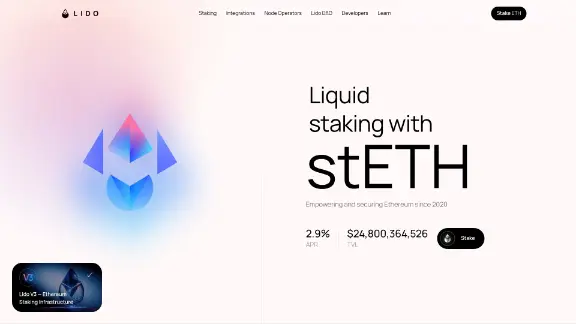Lido Staked Ether (STETH)
Lido Staked Ethereum (stETH) is a token that represents staked Ethereum within the Lido platform. It combines the value of the initial deposit with staking rewards. stETH tokens are created upon deposit and are removed when redeemed.
Overview
Lido platform
Lido is a platform utilizing Ethereum to offer liquid staking services, supported by prominent blockchain staking providers. It enables staked ETH to remain liquid and permits participation with any amount of ETH. Users who stake with Lido receive stETH tokens in a 1:1 ratio to their initial stake. stETH balances can be used like ETH for earning and lending rewards, with daily updates to reflect ETH staking rewards. There are no lock-ups or minimum deposits, allowing users to receive real-time staking rewards and use staked tokens to compound rewards within the DeFi ecosystem.

| Ticker | STETH |
| Category | Decentralized Finance (DeFi) |
| Website | https://www.lido.fi |
| @lidofinance | |
| Telegram | lidofinance |
| https://www.reddit.com/r/lidofinance/ | |
| Contract Addresses | |
|---|---|
| ethereum | 0xae...84 Copied! Copied! |
stETH
Launched in 2020, stETH was created in anticipation of the Ethereum Merge, which introduced the proof of stake consensus mechanism. It serves as a liquidity token, allowing users to deposit their ETH into a smart contract on the Lido blockchain and receive an equal amount of stETH for trading, exchanging, borrowing, or other liquidity purposes. stETH accrues staking rewards regardless of where it is acquired.
Mechanics
stETH token balances are updated daily when the oracle reports changes in Eth2 deposits and ETH rewards from users staking via Lido. This update occurs through a balance rebase, meaning users do not observe a transaction in their wallet; rather, their stETH balance changes automatically. Rebase functionality operates across integrated DeFi platforms like Curve and Yearn. Providing stETH as liquidity on platforms like UniSwap, 1inch, and SushiSwap may result in missing out on some daily staking rewards, as these platforms are not designed for rebasable tokens. ETH deposited via Lido is distributed among node operators and sent to their respective validators.
Reward rate
Users staking their ETH with Lido receive daily rewards through stETH balance rebases. These rebases impact all stETH holders, irrespective of whether their ETH is in the deposit queue.
Use cases
Lido staked ether (stETH) has various use cases as it is designed to serve as a substitute for staked ether (ETH).
Lending
Lending platforms such as Aave allow users to wrap their stETH and other cryptocurrencies for use as loans. The lending value is determined by the wrapped token, which is based on the underlying value of the staked token.
Liquidity pools
Users can combine stETH with ETH in a liquidity pool, enabling them to swap stETH for ETH when desired. This process, known as a pool swap, effectively unstakes a user's ETH.
Yield farming
Staking ETH or stETH offers users the opportunity to earn yields. Platforms like Harvest provide token holders the option to deposit stETH and potentially double their yield earnings.
